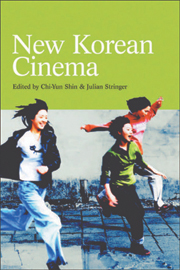Book contents
- Frontmatter
- Contents
- Notes on the Contributors
- List of Illustrations
- Introduction
- Part I Forging a New Cinema
- 1 Contemporary Cultural Production in South Korea: Vanishing Meta-Narratives of Nation
- 2 The Korean Film Industry: 1992 to the Present
- 3 Globalisation and New Korean Cinema
- 4 Chunhyang: Marketing an Old Tradition in New Korean Cinema
- 5 ‘Cine-Mania’ or Cinephilia: Film Festivals and the Identity Question
- Part II Generic Transformations
- Part III Social Change and Civil Society
- Glossary of Key Terms
- Bibliography of Works on Korean Cinema
- Websites
- Index
1 - Contemporary Cultural Production in South Korea: Vanishing Meta-Narratives of Nation
from Part I - Forging a New Cinema
Published online by Cambridge University Press: 05 August 2013
- Frontmatter
- Contents
- Notes on the Contributors
- List of Illustrations
- Introduction
- Part I Forging a New Cinema
- 1 Contemporary Cultural Production in South Korea: Vanishing Meta-Narratives of Nation
- 2 The Korean Film Industry: 1992 to the Present
- 3 Globalisation and New Korean Cinema
- 4 Chunhyang: Marketing an Old Tradition in New Korean Cinema
- 5 ‘Cine-Mania’ or Cinephilia: Film Festivals and the Identity Question
- Part II Generic Transformations
- Part III Social Change and Civil Society
- Glossary of Key Terms
- Bibliography of Works on Korean Cinema
- Websites
- Index
Summary
No discussion of Korean film or culture is meaningful without considering its production within, until recently, an extraordinarily unstable political context. While a halting transition to constitutional rule since 1988 has tempered the violent ups and downs of South Korean politics, it is still a society in which cultural production free from the stultifying influence of governmental controls or political passions is a relatively new experience. Recent global recognition and fascination with Korean film gloss over the complex experience that underlies the evolution of this now vital, innovative and regionally influential industry. The critical emphasis on its freshness, innovation and daringness is particularly ironic in the light of the recent history of South Korean cultural production. Until recently the Korean film industry was in decline and its production, with notable exceptions, focused on generic melodramas (often of poor quality) made expressly for the purposes of gaining licences to screen more profitable Hollywood exports. The shift is a direct result of political changes in South Korea. It also heralds the emergence of a new generation of Korean artists in all fields whose creative energies are free from overt control by the state and, more importantly, the restricting political, cultural and social obsessions that dominated Korean society between its liberation from colonial rule in 1945 until the advent of real civilian democratic politics after 1988.
- Type
- Chapter
- Information
- New Korean Cinema , pp. 15 - 31Publisher: Edinburgh University PressPrint publication year: 2005



